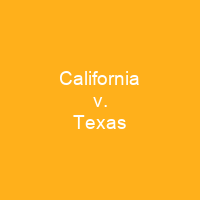California v. Texas is a case pending before the United States Supreme Court that deals with the constitutionality of the 2010 Affordable Care Act. Lower courts found that this individual mandate was a critical provision of the ACA and, without it, some or all of the law was potentially unconstitutional. The case was recognized that the Supreme Court was likely bound for the case in the midst of 2020 elections.
About California v. Texas in brief

The case was recognized that the Supreme Court was likely bound for the case in the midst of 2020 elections, making it a critical issue for either party. The Democrat-controlled House of Representatives also joined in the defense of the case following the 2018 election, bringing the number of defendants to 21. By early 2019, 17 states, led by California, filed an appeal of the decision to the Fifth Circuit Court of Appeals. In March 2019, the case was now in full agreement with the decision that the ACA was unconstitutional as a whole and Texas would now support the full agreement that the whole law was unconstitutional and would make a challenge to the ruling a moot point. The suit, Texas v. Azar, established that since the individualmandate was seen as core provision of ACA, then with its removal, the entire law became an unconstitutional exercise of Congressional taxing power.
You want to know more about California v. Texas?
This page is based on the article California v. Texas published in Wikipedia (as of Nov. 23, 2020) and was automatically summarized using artificial intelligence.







